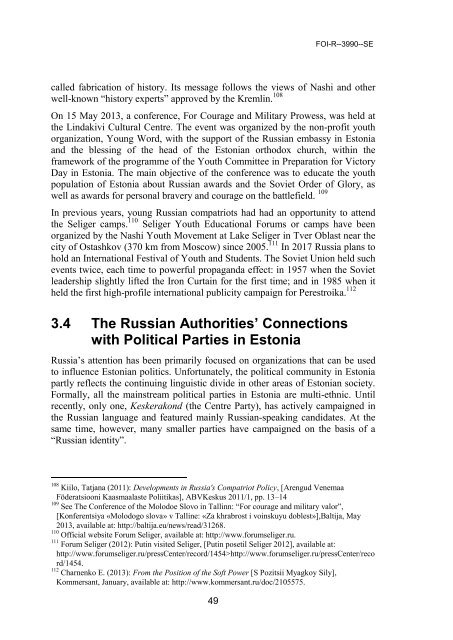FOI-R--3990--SE_reducerad
FOI-R--3990--SE_reducerad
FOI-R--3990--SE_reducerad
Create successful ePaper yourself
Turn your PDF publications into a flip-book with our unique Google optimized e-Paper software.
<strong>FOI</strong>-R--<strong>3990</strong>--<strong>SE</strong><br />
called fabrication of history. Its message follows the views of Nashi and other<br />
well-known “history experts” approved by the Kremlin. 108<br />
On 15 May 2013, a conference, For Courage and Military Prowess, was held at<br />
the Lindakivi Cultural Centre. The event was organized by the non-profit youth<br />
organization, Young Word, with the support of the Russian embassy in Estonia<br />
and the blessing of the head of the Estonian orthodox church, within the<br />
framework of the programme of the Youth Committee in Preparation for Victory<br />
Day in Estonia. The main objective of the conference was to educate the youth<br />
population of Estonia about Russian awards and the Soviet Order of Glory, as<br />
well as awards for personal bravery and courage on the battlefield. 109<br />
In previous years, young Russian compatriots had had an opportunity to attend<br />
the Seliger camps. 110 Seliger Youth Educational Forums or camps have been<br />
organized by the Nashi Youth Movement at Lake Seliger in Tver Oblast near the<br />
city of Ostashkov (370 km from Moscow) since 2005. 111 In 2017 Russia plans to<br />
hold an International Festival of Youth and Students. The Soviet Union held such<br />
events twice, each time to powerful propaganda effect: in 1957 when the Soviet<br />
leadership slightly lifted the Iron Curtain for the first time; and in 1985 when it<br />
held the first high-profile international publicity campaign for Perestroika. 112<br />
3.4 The Russian Authorities’ Connections<br />
with Political Parties in Estonia<br />
Russia’s attention has been primarily focused on organizations that can be used<br />
to influence Estonian politics. Unfortunately, the political community in Estonia<br />
partly reflects the continuing linguistic divide in other areas of Estonian society.<br />
Formally, all the mainstream political parties in Estonia are multi-ethnic. Until<br />
recently, only one, Keskerakond (the Centre Party), has actively campaigned in<br />
the Russian language and featured mainly Russian-speaking candidates. At the<br />
same time, however, many smaller parties have campaigned on the basis of a<br />
“Russian identity”.<br />
108 Kiilo, Tatjana (2011): Developments in Russia's Compatriot Policy, [Arengud Venemaa<br />
Föderatsiooni Kaasmaalaste Poliitikas], ABVKeskus 2011/1, pp. 13–14<br />
109 See The Conference of the Molodoe Slovo in Tallinn: “For courage and military valor”,<br />
[Konferentsiya «Molodogo slova» v Talline: «Za khrabrost i voinskuyu doblest»],Baltija, May<br />
2013, available at: http://baltija.eu/news/read/31268.<br />
110 Official website Forum Seliger, available at: http://www.forumseliger.ru.<br />
111 Forum Seliger (2012): Putin visited Seliger, [Putin posetil Seliger 2012], available at:<br />
http://www.forumseliger.ru/pressCenter/record/1454>http://www.forumseliger.ru/pressCenter/reco<br />
rd/1454.<br />
112 Charnenko E. (2013): From the Position of the Soft Power [S Pozitsii Myagkoy Sily],<br />
Kommersant, January, available at: http://www.kommersant.ru/doc/2105575.<br />
49


